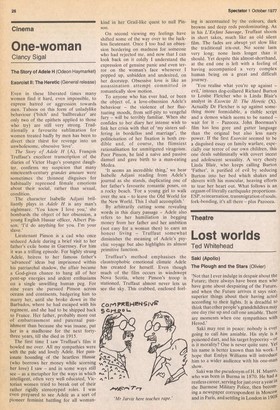Theatre
Lost worlds
Ted Whitehead
Saki (Apollo) The Plough and the Stars (Olivier)
'Not that I ever indulge in despair about the Future; there always have been men who have gone about despairing of the Future, and when the Future arrives it says nice, superior things about their having acted according to their lights. It is dreadful to think that other people's grandchildren may one day rise up and call one amiable. There are moments when one sympathises with Herod.'
Saki may rest in peace: nobody is ever going to call him amiable. His style is a poisoned dart, and his target hypocrisy —or is it morality? One is never quite sure. Yet his name is better known than his work. I hope that Emlyn Williams will introduce him to a wider audience with his one-man show.
Saki was the pseudonym of H. H. Munro, who was born in Burma in 1870. He had a restless career, serving for just over a year in the Burmese Military Police, then becorning a newspaper correspondent in Moscovv and in Paris, and settling in London in 1908 to write social and political sketches. As soon as war broke out he enlisted, served by choice in the ranks, and was killed in action on the Western Front in 1916.
He belonged to the world that vanished with the war — that world of Edwardian, or neo-Georgian, style and affluence, where the servants polished their silver and the nobs polished their epigrams. Calling himself 'Saki' after the cup-bearer in The Rubaiyat of Omar Khayyam — the most Popular coffee-table book of the period— he published four volumes of short stories and two novels. He shared Wilde's delight in caustic elegance of phrase and his relish for satirising the foibles and affectations of the Upper class. 'To be clever in the afternoon means that we are dining nowhere in the evening.' All decent people live beyond their incomes, and those that are not respectable beyond other people's.' But Munro went further: there was a macabre streak to his vision, and he saw civilisation as a very thin varnish over something very nasty indeed. One story tells of a beautiful boy encountered in the woods, who turns into a homicidal beast. Another tells of a Young boy who placidly eats toast while his ward is devoured by his pet polecat, whom he worships as a god. Fauns flit through the drawing room, trolls lurk in the shrubbery.
Emlyn Williams, looking like a precocious young man in his smart blue blazer and turned-up trousers, is brilliant in depicting both the droll and the gruesome aspects of his author's persona. His selection of fourteen sketches illustrates Munro's tonal range, but I wish he hadn't played safe by omitting to show his misogyny and antisemitism: if we're going to have the monster, let's have him whole.
Visually, the director, Peter Woodthorpe, has restricted his production to Emlyn Williams, a cane seat and a stool, With subtle variations in lighting by Joe Davis. A few props might have helped create the atmosphere of the stories, some of Which seem thin in performance — but they Were written for the page and not the stage. I was happy to be swept along with Saki's Malevolent wit and Williams's masterly Impersonation, At the Olivier is a revival of Sean O'Casey's The Plough and the Stars, directed by Bill Bryden with rich Irish performances by Cyril Cusack and J. G. Devlin, but not much else. The personal drama was unconvincing, the political drama unrealised on a stage that seemed to dwarf its characters. And though O'Casey is attacking the rhetoric of false feeling, he resorts too often to a facile rhetoric based on assonance and alliteration — surface' tricks that obscure rather than reveal the self-delusion of the cast of heroes, cowards and Opportunists. What's more important is t1.1,ar, although one can understand Casey's impatience with his countrymen's intransigence, his progressivism now looks shallow: he underestimated the Intensity of the almost theological belief in Irish nationhood. Difficult to do that now.



































 Previous page
Previous page